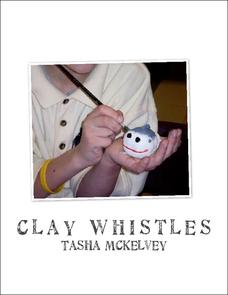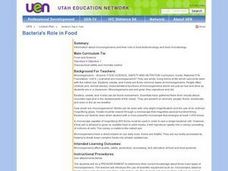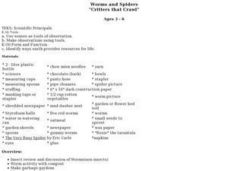Curated OER
Fish Workings
Students observe, hypothesize, and draw conclusions regarding fish. They examine their anatomy, and how they function in their environment.
Curated OER
Adaptations
Eighth graders choose an animal and research its various adaptations using
their information, 8th graders create an informational tri-fold brochure or newsletter. They should include facts about the animal's adaptations as well as...
Curated OER
Observing the Growth Spurt
Students notice a growth spurt in their Brassica plants and closely monitor this growth by measuring their plants and predicting the next day's growth based on the pattern of their data. They also read and highlight the objectives in...
Curated OER
Meet Your Tonsils
Students engage in a lesson that is concerned with tonsils. They identify the parts of the face and mouth as shown on a poster and then conduct class discussion about the function and location of the tonsils. The lesson includes related...
Curated OER
Planting the Seed
Pupils plant their seeds and collect and organize their own materials for planting. They also set up their planters with wicks, fertilizer, potting mix, and seeds. Finally, students write their names on planter markers with a ball point...
Curated OER
Thinning and Transplanting
Students identify and observe one plant per section in their quad and to transplant the surplus seedlings to empty quads and interpret why this is important. They then discuss the purpose of thinning and transplanting. Finally, students...
Curated OER
Harvesting and Threshing the Seed
Students harvest and thresh the seeds. They count the seeds and compare that number with the original number of seeds planted (8) to determine their profit or loss. Finally, students think about additional questions they have about...
Curated OER
Termite Trails
Learners observe the behavior of termites and draw conclusions about their behavior. They record data as to termite behavior and recognize elements in the experimental design which must include a hypothesis.
Curated OER
Memory/Physiology Lab Activity
Students investigate the nervous system and how physical distractions influence mental performance. They work in pairs as a researcher and subject and memorize a series of words with no distractions. After repeating the list of words,...
Curated OER
What Is It?!
Working individually or in groups, 4th graders are presented with unusual or at least unfamiliar objects and are asked to speculate on what they are and/or how they are used. The intention is to get students to make careful observations...
Desert Discoveries
Sonoran Desert Predators and Prey
Here is a fabulous lesson the animals found in the Sonoran Desert. Learners classify these animals as predators, prey, or both! They take a look at the many adaptations that these animals utilize to help them find food, and avoid...
Indiana University
World Literature: "One Evening in the Rainy Season" Shi Zhecun
Did you know that modern Chinese literature “grew from the psychoanalytical theory of Sigmund Freud”? Designed for a world literature class, seniors are introduced to “One Evening in the Rainy Season,” Shi Zhecun’s stream of...
Calvin Crest Outdoor School
Survival
Equip young campers with important survival knowledge with a set of engaging lessons. Teammates work together to complete three outdoor activities, which include building a shelter, starting a campfire, and finding directions in the...
Tasha McKelvey
Clay Whistles
Create clay whistles with your elementary or middle school students. The project is outlined in great detail here, complete with step-by-step photographs, finished examples, a materials list, student handouts, and a rubric. Students...
Council for Economic Education
Economic Data Lesson: Economic Policy Options
Can you make decisions that will impact millions of people around the nation? Scholars research the role of the Federal Reserve, and its Chairman, on the economic outlook of the country. They analyze current trends in unemployment,...
Curated OER
A Bugs Life: Diary of an Insect's Metamorphosis
Students play games to learn about the life stages and metamorphosis of different insects. In this insects lesson plan, students discuss the life of insects, and then play matching, vocabulary, and memory games.
Curated OER
Bacteria's Role in Food
Students grow bacteria cultures on agar in petri dishes and do a plate count. They participate in a yogurt making lab to see how bacteria produce lactic acid. They prepare a recipe and identify fungi, fermentation and the role of...
Curated OER
Magnificent Microscopes
Students use a microscope in a series of activities that are designed to help them explore the "invisible world" and make meaningful microscopic discoveries and learn the importance of the microscope as a tool in science and research.
Curated OER
Barnacles: Harder than Cement
Fourth graders watch the movements of the complex animal hidden inside the tiny barnacle shells. This lesson allows students to study the behavior, adaptation, and larval stage of the barnacle.
Curated OER
(S-4) The Many Colors of Sunlight
Students observe and explore the characteristics of light.
Curated OER
Worms and Spiders: "Critters That Crawl"
Students complete a unit of lessons on spiders and worms. They discuss worm and spider characteristics, create a garbage garden, observe worms, create gummy worm prints, read the book, 'The Very Busy Spider,' and construct a spider and...
Curated OER
Butterfly Introduction
First graders create a KWL chart about butterflies and then read a story about butterflies. In this butterflies lesson plan, 1st graders then discuss the life cycle, body, habits, and facts about butterflies as they read.
Curated OER
Bean There, Done Plant
Pupils explain that events in nature follow an orderly progression when they plant seeds and observe the development of the seeds. They count seeds and find the likenesses and the differences of many seeds.
Curated OER
Mosaic: Press-in Method
Young scholars create individual press-in mosaics using a variety of bought and found objects.

























